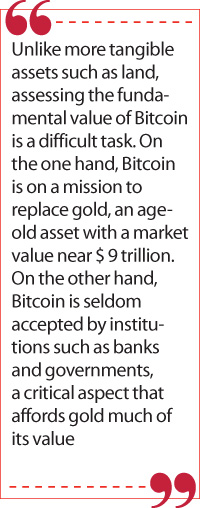Tuesday Feb 17, 2026
Tuesday Feb 17, 2026
Friday, 4 June 2021 01:50 - - {{hitsCtrl.values.hits}}

No one debates the fact that Bitcoin is backed by the most revolutionary impending advancement of technology
 Very few, if any at all of us, have not heard of Bitcoin and the accompanying cryptocurrencies at this point. Over the last few months and for most of this year, the conversation and buzz surrounding the topic of what is now declared the newest global asset class has been growing steadily louder. It’s fair to say the volume was cranked to the top over the last month with Elon Musk, Goldman Sachs, the IRS and the likes joining the conversation.
Very few, if any at all of us, have not heard of Bitcoin and the accompanying cryptocurrencies at this point. Over the last few months and for most of this year, the conversation and buzz surrounding the topic of what is now declared the newest global asset class has been growing steadily louder. It’s fair to say the volume was cranked to the top over the last month with Elon Musk, Goldman Sachs, the IRS and the likes joining the conversation.
What is Bitcoin and blockchain technology?
Bitcoin is a digital currency which is speculated to have been discovered in January of 2009 as a white paper which was circulated in online forums by a hitherto mysterious founder – Satoshi Nakamoto. With a founding story fitting of the notoriety it has gained since then, Bitcoin then proceeded to be a technology project which set in motion the events leading to development of blockchain technology.
To gloss over much of the detail, blockchain technology is a protocol which enables publicly visible transactional chains in a network of peer-to-peer nodes. The technology is simply referred to as a digitised ledger, but uniquely one that doesn’t allow tampering and reversals given its decentralised nature.
Simply put, blockchain technology is a record of secure transactions maintained by a wide network of computers. Naturally, the technology has a use case as a currency and payment protocol in addition to being widely applicable in healthcare to maintain medical records, in education to store exam results, in logistics to track asset mobilisation and in government to maintain public records of national budgets; among an infinite list of other use cases.
Bitcoin, on the other hand is the first manifestation of this technology and was in its early form a digital currency with anonymity and secure transactability. The most current conversation around Bitcoin largely considers it to be a store of value, much like gold. In fact, much of the conversation is centred on the idea that Bitcoin will soon replace gold as a storage medium for value.
 The value of Bitcoin
The value of Bitcoin
The concept of value is a far more complicated matter than one may think on initial terms. Value in our everyday lives quite loosely translates to price; in that, the value of a good or service is interchangeable with its price. This is a good place to start the conversation. The idea that price, as determined by the aggregate demand and supply for a good or service is the value of the said good or service is based on the process of price discovery.
While price discovery in the marketplace is a reliable method to determine value of an asset, there are instances when an asset falls outside of this criterion. Firstly, investors, especially value investors are inquisitive of the actual value for an asset in order to understand what its future value will be. In this particular event, current price discovery is a less than reliable measure of actual value. The value of an asset in a period of 5 or 10 years into the future is far removed from its current value. In this situation, investors resort to assessing the fundamental value of the asset in question.
This is where the controversy starts for Bitcoin. Unlike more tangible assets such as land, assessing the fundamental value of Bitcoin is a difficult task. On the one hand, Bitcoin is on a mission to replace gold, an age-old asset with a market value near $ 9 trillion. On the other hand, Bitcoin is seldom accepted by institutions such as banks and governments, a critical aspect that affords gold much of its value.
Adding to the difficulty in assessing fundamental value, Bitcoin prices are highly volatile. In the past month of May, Bitcoin lost nearly 60% of its total value in the market and regained most of it in a period of a few days. This level of volatility is unheard of in any other mainstream asset class.
The dip
In trading terms, the dip is a loss of value experienced by an asset as a result of the asset being oversold or exceeding demand in supply. The selling pressure of Bitcoin in the market over the last few weeks caused Bitcoin to lose over half of its value, cleanly erasing the value of many investors’ portfolio and also pulling the cryptocurrency market now estimated to be nearly $ 2.2 trillion under with it. This volatility and the crash appeared to confirm the idea of Bitcoin opponents that the entire asset is trading in a bubble. Of course, the story doesn’t end there.
In a period of less than a week, Bitcoin recovered most of its value back, proving that the volatility applies both ways and that the process of price discovery in the market is not completely unable to correct the asset price.
Of course, this yo-yo momentum raises many questions that need immediate answers against the backdrop of Bitcoin being declared as an accepted asset class by Goldman Sachs Bank.
Now more than ever, the questions of what is fair value for Bitcoin and what fundamental principles are involved in determining that value need answers that investor communities, institutions and the general public can agree on.
Inflationary hedging
Part of the reason why Bitcoin is attractive to investors is the inflationary protection it provides. In uncertain economies like Sri Lanka where the depreciation of the Rupee is controlled by restrictions imposed on imports and through tight foreign currency regulations, Bitcoin is a sound investment avenue.
Inflationary loss of value is a concern for any investor, on the basis that the true value of their investments deteriorates under the weight of an under-performing currency. Estimates of inflationary impact are debated over anywhere between 10% to 25% annually. Bitcoin as an asset class even with the intensity of its volatility has been successful in returning an astounding 4,822,525% return over a decade at its highest trading price recorded in February this year. If historical figures are anything to go by, it’s difficult to imagine an asset class that can compare with Bitcoin.
The fair value conversation
At long last, with the facts established, the final question emerges: what is fair value for Bitcoin and how should it be assessed?
To be clear, there is no widely accepted answer to this question.
Sentiments and opinions on the matter vary wildly; with Warren Buffet calling Bitcoin “rat poison squared,” and Max Keiser quoted stating “Bitcoin is the currency of resistance.” The global conversation is very much open ended and for now, the conclusion can only be speculated on.
But here is what we know.
No one debates the fact that Bitcoin is backed by the most revolutionary impending advancement of technology. Blockchain technology is largely predicted to potentially have the ability to replace fiat currencies and the internet itself in a truly decentralised way.
However, Bitcoin is a non-productive asset class with no real intrinsic value at present. In these terms, Bitcoin is valued on the basis of its tradability and the concept that someone else will purchase the asset for a greater value. This in itself is problematic. However, with only 14% of the US population adopting cryptocurrency, it isn’t a bad bet to assume that value will continue to rise with mass adoption. Also, take into consideration the idea that gold too has no real intrinsic value nor productivity except for the value given to it by its tradability.
On the other hand however, is the question of regulation. China recently made an announcement that it will look to ban cryptocurrency within the country, and the IRS announced intentions to tax and regulate capital gains from cryptocurrency. Regulation is a dangerous spanner in the works for a currency which primarily requires liquidity and acceptance to fulfil its function.
However, the numbers are still on Bitcoin’s side, with the returns on investments made by early entrants far exceeding any other investment instrument and for the large part delivering effectively on its promise of hedging against inflation.
With much of the matter discussed, conclusions drawn may differ, but it may appear that Bitcoin is a choice investment class for investors with the risk appetite and holding power to outlast the intense volatility. With certainty, Bitcoin is a consideration at the very least, when allocating assets towards a personal or organisational portfolio of investments.
(The writer is the Head of Marketing (SL) and Communication (Asia Pacific, Europe and Middle East) for a global technology blue chip. He is also the Founder and former CEO of Cyaniq Global LLC.)